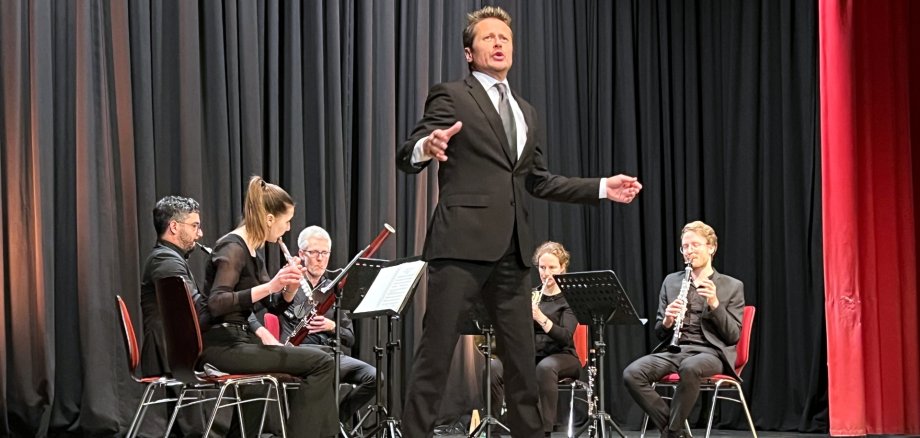The focus of this year's commemorative event, which took place last Saturday in the municipal theater, was the musical reading 'Ich wand're durch Theresienstadt', presented by actor Roman Knižka and the OPUS 45 wind quintet. The commemorative event was supported by the Partnership for Democracy in the Birkenfeld National Park District and sponsored by the Federal Ministry for Families, Senior Citizens, Women and Youth as part of the federal program 'Demokratie leben!
In his speech, Lord Mayor Frank Frühauf emphasized that it is necessary to keep the memory of the atrocities committed by the National Socialists alive. Particularly in view of current events, it should not be forgotten that this was possible. "There must be no place for racism and xenophobia, for exclusion and contempt in Idar-Oberstein." We must be vigilant against all attempts to undermine the basic rules of our society and stand up for human rights. Lord Mayor Frühauf therefore also welcomed the demonstration against right-wing extremism that took place before the memorial event and was attended by around 1,000 people.
Shalom Chairman Axel Redmer emphasized that the memorial event was not an end in itself, but a necessity. After all, some of the reports coming out of the memorial sites were frightening. For example, teachers visiting the site with their school classes questioned whether six million Jews were actually murdered. "As if the Holocaust would be less bad if it had 'only' been four or five million, that's perverse."
The speeches were followed by a 90-minute program in which actor Roman Knižka presented texts and memories of young people who were imprisoned in Theresienstadt at the time. For example, a 12-year-old boy told of his arrival at the camp and the first job he had to do there: loading the people who had died the night before onto a cart and transporting them. Other texts tell of the catastrophic living conditions, the omnipresent hunger and the constant fear of death, but also of the lively cultural life that developed in Theresienstadt. Despite the unspeakable circumstances, the prisoners organized lectures, theater and opera performances, cabaret, jazz concerts and chamber music performances. The children's opera 'Brundibar' alone was performed more than fifty times with great success.
The cultural activities of children, young people and adults in Theresienstadt were first tolerated by the National Socialist rulers and then cynically misused for propaganda purposes: Theresienstadt was presented to the world public as a 'model camp' with a wide range of leisure activities. However, none of this can hide the fact that this place was a 'forecourt of hell': one in four of the Jews imprisoned in Theresienstadt died there. Of the almost 15,000 children who were sent to Theresienstadt, only 132 survived.
Roman Knižka brought all the horrors, but also the "sweet triumph over madness", as the Brundibar performances were described in one of the texts, to the stage in a way that was as haunting as it was impressive. In addition, the OPUS 45 wind quintet played works by composers who were imprisoned in Theresienstadt, including Pavel Haas, Hans Krása, Viktor Ullmann and Gideon Klein. The performance by the five members of the ensemble was of a high artistic standard and combined with the recitations to create an impressive reminder against forgetting. This performance was rightly acknowledged by the audience with standing ovations.

